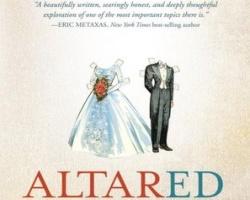Yes, the rumors are true. The two of us dated, broke up, and then wrote a book about marriage and love, together. Yes, it was crazy. No, we don’t recommend it.
Our book, Altared, isn’t really about marriage, though. It’s about the Christian preoccupation with marriage. It is not a book about why marriage is bad (or good), or why a person shouldn’t (or should) get married. Altared is about why some Christians put too much emphasis on it to begin with. (And by “some Christians” here, we mean first and foremost ourselves.) It’s a book that asks: What if God is less worked up about marriage than we are?
Once we asked ourselves the question, it sprawled into other questions and a whole host of issues: love, self-denial, solitude, loneliness, forgiveness. These topics collided with all the signs of marriage-happiness we saw around us.
To name just a few:
First, Jesus and Paul were single, as were quite a few of the other figures in the New Testament, however we almost never saw a single leader in the church.
Second, New Testament writers almost never discussed romantic love—and they only occasionally talked about marriage—whereas we discussed dating and marriage all the time in our Christian communities. We had heard roughly ten sermons on
But all that was only a drop in the bucket compared to what we realized next:
Before either of us had thought about what it meant to love our neighbor, we had thought extensively about what we wanted in a spouse. Over the course of a long, long time, we had thought very, very hard about what would make someone worthy of our love. However, we had rarely dealt with the simple, but radical idea that only one thing qualifies another person for the love of Christ: that person is your neighbor.
Now, the point here isn’t to suggest that one should marry one’s neighbor (thank goodness!); the point is that the two of us had missed one of the two greatest commandments. We had spent so much time pondering what love meant for The One, that we had not even started to think about what it meant for our neighbor. And from what we could tell, this was true not only of us, but also of many other Christians close to us.
In other words, many of us were seeing love mainly through the lens of marriage, rather than seeing marriage through the lens of Christian love. We looked to Christ’s love when we needed help with marriage but not as the guide of our life otherwise. And all this while Christ says in
What type of love was His love? At a minimum, Christ loved all who were near—the cultural outcast, His disciples, His enemies, the least of these. Even on the cross, He offered a heartrending plea for His enemies: “Father, forgive them, for they know not what they do.”
Our love was different. Our love was happy to set its own path, and only ready to ask for help once the path went crooked. Our love—if we were honest—was more interested in dating tips than lessons about how to love one’s enemy, or how to love the least of these. Sure, we might have talked about those topics in a small group now and then, but we showed scant interest with our lives. We were hardly known by our love.
This is what Altared is about, more or less. It is the story of how we discovered that the love of Christ is about more than finding (and managing) the marriage we want. It is a love story, yes; but through the strange circumstances of our lives, we found God and our neighbor at the center of a much larger story of Love.




